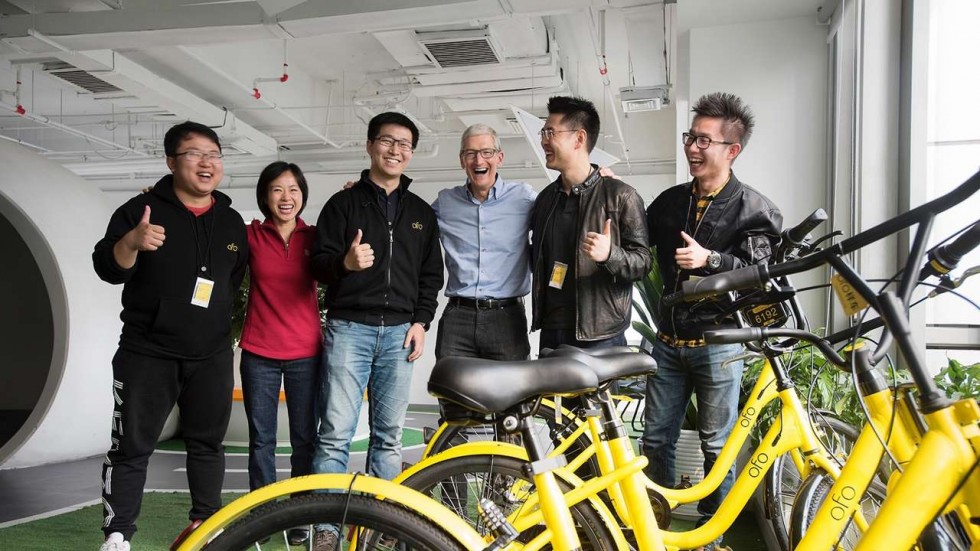How Beijing Startup Ofo is Bringing China's Latest Export to the Rest of the World
This post comes courtesy of our content partners at TechNode.
Ofo, China’s latest bike-rental unicorn that Apple CEO Tim Cook paid his tribute to during China visit, is looking beyond the borders of the middle kingdom.
“The act of bike-sharing could someday become a lingua franca, connecting people around the world,” said Dai Wei (pictured center left above with Tim Cook) last week at Boao Forum for Asia.
READ: Will the Authorities Slow the Out-of-Control Roll of the Bike Sharing Revolution?
The company’s bold global expansion initiative comes as arch local competitor Mobike and a group of smaller players are looking at the overseas market. However, it’s still not clear whether it’s a smart move for the new upstart company to open a new battlefield in comparatively developed markets while it’s still entangled in a tough war with domestic players.
Where’s Ofo overseas now?
Amid hot local competition with Mobike and a slew of smaller rivals, Ofo has expanded strategically since the end of last year.
Companies have their own expansion styles, so it didn’t surprise us when Ofo rolled out its service in Singapore earlier this year as the first Chinese bike-rental company to operate overseas.
Up to now, Ofo Singapore has launched thousands of bicycles, attracted tens of thousands registered users, according to the company. They also say they have been running trials in San Diego and London area.
“Ofo chose those areas because of the strategic locations for further expand into the US, Europe, and South East Asia,” said a spokesperson.
Closed areas and beyond
Founded by Peking University alumni, Ofo was born out of a project to address campus transportation problems and gradually developed into a cycle-rental platform for urban residents. The Beijing-based startup takes closed or semi-closed areas like the office parks and college campuses as their entry points for overseas market.
However, it is widely believed expanding beyond small communities and schools would be difficult for the company in the US or other foreign countries, given they are far less populated than China and have higher car penetration rate. Furthermore, people would consider bike cycling more of a lifestyle or recreation than a transportation means.
“Surprisingly, the demand for bikes are quite high in many cities in foreign countries. The demand for short-distance commute is high in a lot of places, people are not biking mostly because of the lack of convenient means,” said the spokesperson. “Most bike-sharing programs in foreign countries are the ones with docking stations, usually expensive and do not have wide coverage.”
Bike sharing is nothing new for the US nor the UK. But in old bike-sharing programs, like New York City’s Citibike, the expensive cycles are borrowed from and returned to docks in inconvenient locations. Citibikes, at USD 163 dollars a year, are also prohibitively expensive for many. The Chinese company is having an edge with a much cheaper alternative of RMB 1 (USD 0.15) to the crowded metro or the gridlocked highway.
Localization and regulation
The company plans to adopt localize in accordance with regional laws and regulations, as well as the preferences of local users. For example, Ofo’s signature yellow bike is larger in the US and UK markets to better fit the figures of local cyclists. The company has also added lights to its bikes to stay compliant in the US.
READ: Now That Bike-Sharing is Wicked Convenient, Beijing Steps in to Make it Less So
“The challenge is to adapt to the local market, not just from an operational angle, but also culturally. We don’t see it as an obstacle but a challenge which any services would face when going to a foreign country,” said the spokesperson. “Ofo believes with its experience and values, more markets will see the potential of our value and services.”
“Ofo is working with municipality management and help with making rules and regulations which will contribute to a more orderly city planning in the places we operate in,” they added. “The countries we have started our pilot programs are very supportive of Ofo’s operation plan.”
Photo: Ofo





